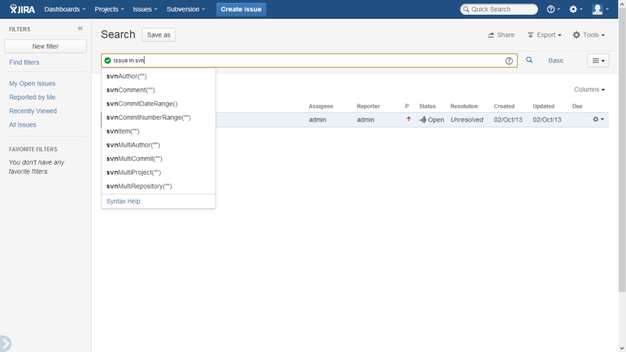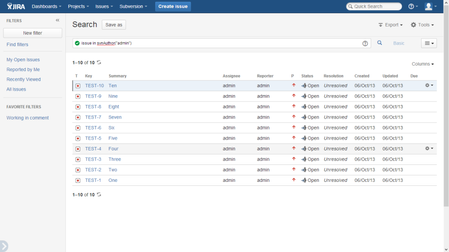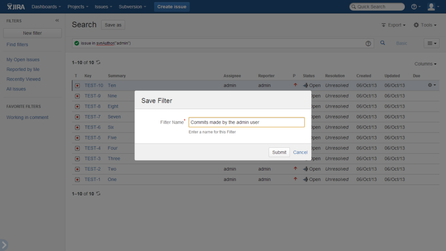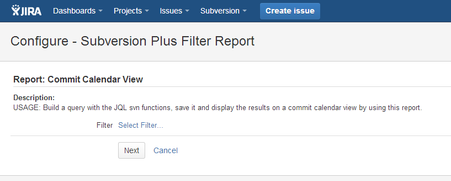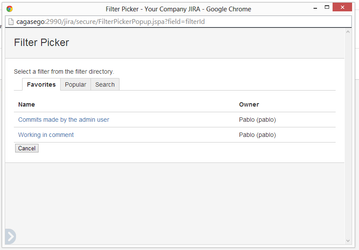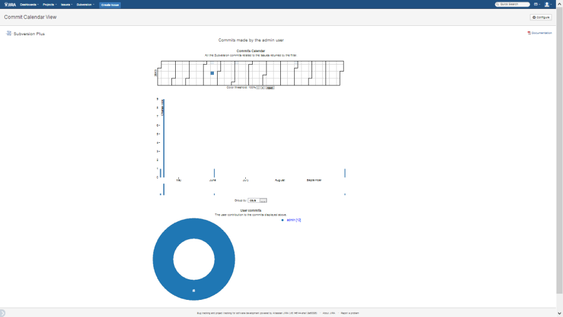...
The JQL functions provided by Subversion ALM allows searching issues filtering by Subversion attributes like author, date range, commit range, words in comment, files and subdirectories, etc. while the Commit Calendar View shows commits in an interactive calendar.
| Anchor | ||||
|---|---|---|---|---|
|
Several JQL functions are supported by Subversion ALM allowing users to search issues on JIRA by using Subversion attributes like the commit author, commit date range, committed files and directories, any words in the commit message, etc.
All the Subversion ALM JQL functions:
...
- Attribute functions: they allow searching issues on JIRA by using Subversion attributes:
- svnCommitNumberRange
- svnCommitDateRange
- svnAuthor
- svnItem
- Aggregation functions: they allow searching issues on JIRA by aggregating (counting/amount) some Subversion attribute:
- svnMultiCommit
- svnMultiAuthor
- svnMultiProject
- svnMultiRepository
| Anchor | ||||
|---|---|---|---|---|
|
svnCommitNumberRange | ||||||
It returns the issues related to commits between a revision range on an specific repository | ||||||
# | Name | Type | Required | Values | Description | |
1 | repoId | Integer | Yes | >0 | The repository Id | |
2 | start | Integer | No | >=0 | The start revision of the range | |
3 | end | Integer | No | >= 0 | The end revision of the range | |
4 | limit | Integer | No | >=1 | Limits the number of returned issues |
Example:
issue in svnCommitNumberRange(5,4364,"",10)
Meaning:
It returns maximum 10 issues related to the latest commits from the 4364 (included) revision to the HEAD in the repository Id=5.
svnCommitDateRange | ||||||
It returns the issues related to commits between a date range on all the repositories | ||||||
# | Name | Type | Required | Values | Description | |
1 | repoId | Integer | Yes | >=0 | Zero means all the repositories. | |
2 | start | String | No | yyyy-MM-dd | The start date of the range | |
3 | end | String | No | yyyy-MM-dd | The end date of the range | |
4 | limit | Integer | No | >=1 | Limits the number of returned issues |
Example:
issue in svnCommitDateRange (0,"2013-02-01","",99)
It returns maximum 99 issues related to the latest commits on any repository from the February, 1st 2013.
svnAuthor | |||||
It returns the issues related to commits made for an specific user | |||||
# | Name | Type | Required | Values | Description |
1 | username | String | No | Any | An empty string means no username (null). |
2 | repoId | Integer | No | >=0 | Zero means all the repositories. |
3 | limit | Integer | No | >=1 | Limits the number of returned issues |
Example:
issue in svnAuthor ("sally",0,1)
It returns one issue (if any) related to the latest Sally's commit on any repository.
svnItem | |||||
It returns the issues related to commits modifying a file or subdirectory | |||||
# | Name | Type | Required | Values | |
1 | Item | String | Yes | Path | A path or file name |
2 | Action | String | No | A,M,D,R,"" | The action on the item |
3 | repoId | Integer | No | >=0 | Zero means all the repositories. |
4 | limit | Integer | No | >=1 | Limits the number of returned issues |
Examples:
- issue in svnItem("myfile.txt","D",3)
- issue in svnItem("/foo/myfile.txt","",3,5)
- issue in svnItem("/foo","A",3)
- issue in svnItem("/foo/","",3,10)
...
- It returns all the issues related to the commit which deleted a "myfile.txt" file in the repository 3 regardless the file location. As no path is set, it will search for the file in all the branches.
- It returns the issues related to the latest 5 commits changing the exact "/foo/myfile.text" file in the repository 3. As the path is set to "/foo" it will look for the file in that exact branch.
- It returns all the issues related to the commit which created the exact "/foo" branch. Notice that the branch name does not end with a slash "/" character, so the subdirectories are ignored.
- It returns 10 issues related to all the commits modifying something under the "/foo" branch. Notice that the branch name ends with a slash "/", hence all the subdirectories will be taken in consideration during the search.
| Anchor | ||||
|---|---|---|---|---|
|
Sometimes managers want to track some potential risks. Subversion ALM supports some useful JQL functions in order to help them:
svnMultiCommit | |||||
It returns issues related to a minimal amount commits | |||||
# | Name | Type | Required | Values | |
1 | count | Integer | Yes | > 0 | Minimal amount of commits |
2 | limit | Integer | No | >=1 | Limits the number of returned issues |
Example:
issue in svnMultiCommit (5, 10)
What are the most recent 10 issues which have been related to 5 or more commits on any repository?
svnMultiAuthor | |||||
It returns issues with commits from several authors | |||||
# | Name | Type | Required | Values | |
1 | count | Integer | Yes | > 0 | Minimal amount of different authors |
2 | limit | Integer | No | >=1 | Limits the number of returned issues |
Example:
issue in svnMultiAuthor (3, 10)
What are the 10 most recent issues which have commits from more than 3 different users?
svnMultiRepository | |||||
It returns issues with commits on different repositories | |||||
# | Name | Type | Required | Values | |
1 | count | Integer | Yes | > 0 | Minimal amount of different repositories |
2 | limit | Integer | No | >=1 | Limits the number of returned issues |
Example:
issue in svnMultiRepository (2)
What are all the issues having commits on 2 or more repositories? (Cross repository issues are not allowed in this company).
svnMultiProject | |||||
It returns issues with commits affecting to different JIRA projects | |||||
# | Name | Type | Required | Values | |
1 | commits | Integer | Yes | > 0 | A path or file name |
2 | limit | Integer | No | >=1 | Limits the number of returned issues |
Example:
issue in svnMultiProject (2, 10)
What are the recent issues that have commits on 2 on more JIRA projects?
| Anchor | ||||
|---|---|---|---|---|
|
The Commits Calendar Report allows visualizing the commits related to the issues returned by any filter.
Prior to use it, a JQL query has to be saved:
From the top menu: Subversion > SVN Filter Report
Click on the Select Filter… link:
Select a filter and click on the Next button:
This page shows:
...
